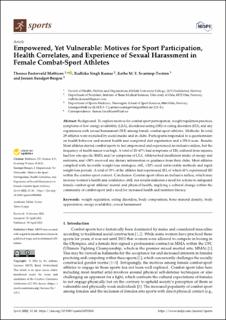| dc.contributor.author | Mathisen, Therese Fostervold | |
| dc.contributor.author | Kumar, Radhika Singh | |
| dc.contributor.author | Svantorp-Tveiten, Kethe Marie Engen | |
| dc.contributor.author | Sundgot-Borgen, Jorunn | |
| dc.date.accessioned | 2022-08-04T09:38:00Z | |
| dc.date.available | 2022-08-04T09:38:00Z | |
| dc.date.created | 2022-04-29T16:40:54Z | |
| dc.date.issued | 2022 | |
| dc.identifier.citation | Sports. 2022, 10(5), Artikkel 68. | en_US |
| dc.identifier.issn | 2075-4663 | |
| dc.identifier.uri | https://hdl.handle.net/11250/3010107 | |
| dc.description | This article is an open access article distributed under the terms and conditions of the Creative Commons Attribution (CC BY) license (https://creativecommons.org/licenses/by/4.0/). | en_US |
| dc.description.abstract | Background: To explore motives for combat sport participation, weight regulation practices, symptoms of low energy availability (LEA), disordered eating (DE) or eating disorders (ED), and any experiences with sexual harassment (SH) among female combat-sport athletes.
Methods: In total, 29 athletes were recruited by social media and in clubs. Participants responded to a questionnaire on health behavior and mental health and completed diet registration and a DXA-scan.
Results: Most athletes started combat sports to feel empowered and experienced an inclusive milieu, but the frequency of health issues was high. A total of 21–67% had symptoms of ED, suffered from injuries, had low site-specific BMD, and/or symptoms of LEA. Athletes had insufficient intake of energy and nutrients, and <50% received any dietary information or guidance from their clubs. Most athletes complied with favorable weight-loss strategies; still, >20% used unfavorable methods and rapid weight-loss periods. A total of 70% of the athletes had experienced SH, of which 41% experienced SH within the combat-sport context.
Conclusion: Combat sport offers an inclusive milieu, which may increase women’s health and confidence; still, our results indicates a need for actions to safeguard female combat-sport athletes’ mental and physical health, implying a cultural change within the community of combat sport and a need for increased health and nutrition literacy. | en_US |
| dc.language.iso | eng | en_US |
| dc.relation.uri | https://www.mdpi.com/2075-4663/10/5/68#cite | |
| dc.subject | body appreciation | en_US |
| dc.subject | body composition | en_US |
| dc.subject | bone mineral density | en_US |
| dc.subject | eating disorders | en_US |
| dc.subject | energy availability | en_US |
| dc.subject | sexual harassment | en_US |
| dc.subject | weight regulation | en_US |
| dc.title | Empowered, yet vulnerable: Motives for sport participation, health correlates, and experience of sexual harassment in female combat-sport athletes | en_US |
| dc.type | Peer reviewed | en_US |
| dc.type | Journal article | en_US |
| dc.description.version | publishedVersion | en_US |
| dc.rights.holder | © 2022 by the authors | en_US |
| dc.source.pagenumber | 14 | en_US |
| dc.source.volume | 10 | en_US |
| dc.source.journal | Sports | en_US |
| dc.source.issue | 5 | en_US |
| dc.identifier.doi | 10.3390/sports10050068 | |
| dc.identifier.cristin | 2020213 | |
| dc.description.localcode | Institutt for idrettsmedisinske fag / Department of Sports Medicine | en_US |
| dc.source.articlenumber | 68 | en_US |
| cristin.ispublished | true | |
| cristin.fulltext | original | |
| cristin.qualitycode | 1 | |
